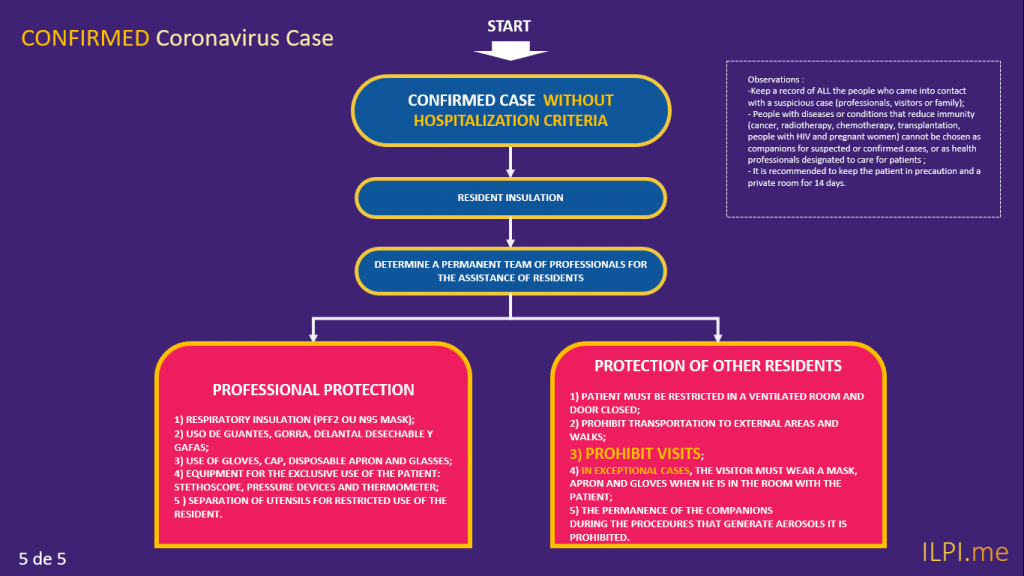Service Protocol for Confirmed Infection
Confirmed Case of CORONAVIRUS
Isolation Protocol
Temporary isolation at the ILPI - until referral is obtained.
General Guidelines
- Patients with confirmed coronavirus cases, without hospitalization criteria, who were discharged from the hospital and instructed to return to the residential area, should remain in private rooms;
- If it is impossible to guarantee a room for each suspicious case remains isolated, define a space temporarily reserved for this purpose;
- There must be visual communication to alert respiratory isolation of drops and contact;
- Specific professionals should be determined to work in the isolation area, preferably, the assistance of this team to other patients is prohibited.
- The least number of employees should circulate in the room. To minimize professional exposure, we recommend that:
- – Clothing professionals do not enter rooms:
- -Nutritionists conduct an assessment over the phone;
- – Waiters do not enter the room, lining up the delivery with the nurse.
Clinical Table
- Most symptoms are mild: fever, fatigue, cough (dry or productive), anorexia, myalgia, asthenia, sore throat, nasal congestion, or headache. Possible: diarrhea, nausea and vomiting. Older people may have atypical symptoms;
- However, in 20% of cases there can be serious manifestations such as:
– Severe pneumonia: presence of fever and respiratory symptoms + RF> 30, Acute respiratory distress syndrome (ARDS) and Saturation ≤93%;
–Sepsis;
– Septic shock.
DIAGNOSIS
- PCR for COVID-19 nasopharyngeal and oropharyngeal swab.
COMORBIDITIES RELATED TO THE WORST PROGNOSIS
- Fragile elderly: the greater the degree of functional dependence, the greater the risk *;
- Presence of diseases such as:
-Chronic Respiratory Diseases (COPD, asthma or other chronic bronchitis);
-Cardiovascular Diseases (Hypertension, coronary artery disease / AMI – acute myocardial infarction, history of CVA – Cerebrovascular accident ) ; - Diabetes Mellitus;
- Chronic Kidney Disease;
- Immunosuppressed patients.
- Determine the degree of fragility of residents – IVCF 20

Attend the Video Lessons on the subject
We prepare free video lessons so that ILPI professionals are well prepared for various types of situations.
CLICK HERE TO ACCESS THE LESSONS PLAYLIST.
CLICK HERE And also see specialized tips on how to prepare the environment.
(study by: GEA-Hosp: Study Group on Hospital Architecture and Engineering, Faculty of Architecture of the Federal University of Bahia and ABDEH)


